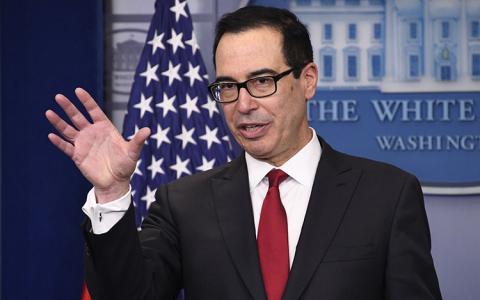
With the $670 billion Paycheck Protection Program thrust into the spotlight again on the heels of May’s better-than-expected jobs report, Treasury Secretary Steven Mnuchin acknowledged the need for more targeted relief spending in his testimony with Small Business Administrator Jovita Carranza before Senate lawmakers on Wednesday.
KEY FACTS
"We're open-minded, but we absolutely believe small businesses, and by the way, many big businesses in certain industries, are absolutely going to need more help," Mnuchin said during the hearing, though he also acknowledged that the next round of aid would need to be “more targeted” to specific industries.
As of June 6, more than $511 billion in PPP loans had been distributed to about 4.5 million small businesses; more than $130 billion in loan money is still available.
The PPP is being viewed as a major factor in the economy’s recovery especially after May’s surprising job gains (the U.S. added 2.5 million jobs instead of the loss of 9 million that most experts were expecting).
The bulk of job gains came in the sectors that were hit hardest by the pandemic including retail, restaurants, and construction; those are also the industries that received significant PPP support.
Treasury Secretary Steven Mnuchin said that moving forward, the SBA will relax restrictions on PPP loans for borrowers with criminal records by reducing the time they would be barred from applying after a conviction from five years to three years.
After two rocky months of operation, much of the attention on the PPP has now turned from loan approvals to loan forgiveness; Mnuchin said borrowers will still be eligible for partial forgiveness if they spend less than 60% of their loan money on payroll.
As the first round of PPP funds begins to run out for many businesses, Senator Ben Cardin (D-Md.) says he plans to introduce a proposal that allows borrowers with fewer than 100 employees to take out a second PPP loan.
TANGENT
Four years after his failed presidential bid, Marco Rubio (R-Fla.) has emerged as an influential force in Washington after his stewardship of the Paycheck Protection Program placed him in the national spotlight once again.
KEY BACKGROUND
The CARES Act, signed into law by President Trump at the end of March, established the Paycheck Protection Program—a $350 billion program administered by the Small Business Administration to provide forgivable loans to cover payroll and overhead expenses, intended to keep mom-and-pop shops from folding. The program saw a rush of applications when it first opened and, as a result, ran out of money in just two weeks. A scrambling Congress then passed new legislation to restart the program with another $310 billion, with $60 billion of that money reserved for smaller businesses without existing banking relationships. Last week, President Trump signed a bill to make it easier for businesses to have their Paycheck Protection Program loans forgiven by relaxing restrictions on how the loan money can be used and extending the period that businesses have to use the funds.
WHAT TO WATCH FOR
As lawmakers struggle to reach an agreement over extending the CARES Act’s emergency benefits, May’s jobs report has the potential to derail the next round of federal rescue legislation. There is now concern among lawmakers that Friday’s positive numbers—touted by President Trump as a “stupendous” victory for the economy and his administration—will erode enthusiasm for another big relief package. Lawmakers will undertake tough negotiations in the coming weeks.
This article originally appeared on Forbes.



